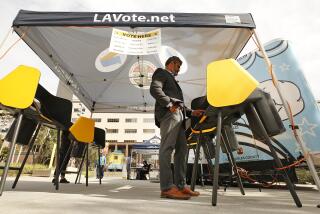Board Deals Setback to Wilson Fund Raising : Politics: Regulators reject bid for exemption from rule on securities dealers who donate to presidential campaigns.
- Share via
WASHINGTON — In a setback for Gov. Pete Wilson’s presidential campaign fund raising, regulators Wednesday denied his request for an exemption from a rule barring municipal securities dealers who make political contributions from doing some kinds of business with the state.
The rule, designed to prevent conflicts of interest and favoritism in the awarding of state and municipal bond contracts, would prohibit municipal securities dealers from handling much of California’s lucrative bond work for two years if they donate to his bid for the Republican presidential nomination.
His campaign had urged that regulators apply the rule to all presidential candidates if they would not exempt Wilson.
In a May 31 letter to Wilson’s campaign, the federal Municipal Securities Rulemaking Board, a self-regulating group overseen by the Securities and Exchange Commission, rejected Wilson’s arguments that the rule should not apply to him and that his rivals who are members of Congress and private citizens should be covered as well.
Christopher A. Taylor, executive director of the board, said of the five-page response: “In our judgment, this is simply a restatement of the rules.”
Benjamin Ginsberg, the chief counsel for Wilson’s campaign, said in a prepared statement that the campaign was disappointed “by the board’s unwillingness to create a level playing field for the other presidential candidates” by stipulating that their contributors must face the same restrictions.
But he added: “We do not expect the MSRB ruling to significantly impact our campaign’s fund-raising activities, or to present any other problems to the campaign.”
Ginsberg had said in his May 5 letter to the board that some individuals in the municipal securities industry “have declined to contribute or raise funds for the Wilson effort solely on account” of the rule.
As Wilson seeks to raise the $20 million or more that he will need for his initial campaign, the stakes are potentially significant. George Bush took in nearly $1 million from securities and investment banking firms in 1992; Bill Clinton raised $700,000 from those sources.
The rule, known as G-37, was adopted in the face of growing concern that securities industry campaign contributions to state and local officials were creating a “pay-to-play” environment in the $1.2-trillion municipal bond business.
Banks, securities firms and individuals that give $250 or more to any state or local official with influence over municipal bond decisions are prohibited from engaging in non-competitive municipal securities business with that entity for two years. Firms or individuals outside the jurisdiction issuing bonds face a two-year ban if they contribute any money at all.
Regulators have expressed concern generally that if a state official such as Wilson were to fail in his bid for federal office, he would remain in his current job and be positioned to favor those who had contributed to his campaign.
The board said that the rule applies to Wilson because as governor he names members to boards with the authority to issue bonds. For example, the governor appoints six of 11 members of the California Housing Finance Agency, which issues bonds.
Ginsberg had contended that unlike other chief executives, the governor of California “is not directly or indirectly responsible for, nor can he or she influence” the hiring of a broker or municipal securities dealer by the state, which is largely the responsibility of the independently elected state treasurer.
The board also rejected Ginsberg’s argument that if the rule applies to Wilson it should cover all presidential candidates, including President Clinton, because the President has the power to appoint a newly created financial control board to oversee the financially ailing District of Columbia government, which has bonding authority.
The board said that the President does not hold an elective office of an “issuer” of municipal securities nor does he hold an elective office at the state or local level that would place him under the rule.
The board also denied that the rule imposes an unfair burden on Wilson’s freedom of speech and association. Citing earlier SEC language on this point, it said: “The MSRB cannot overlook potential conflicts of interest solely because there are candidates for the same federal office who do not face the same conflicts. In any event, the resulting burden to current local officials does not appear to be significant.”
California Democratic Chairman Bill Press, who had urged the board to turn down Wilson’s appeal, called the decision “another blow for Pete Wilson. Clearly Pete Wilson tried to bend the rules in his favor and it didn’t work.”
More to Read
Get the L.A. Times Politics newsletter
Deeply reported insights into legislation, politics and policy from Sacramento, Washington and beyond. In your inbox twice per week.
You may occasionally receive promotional content from the Los Angeles Times.










